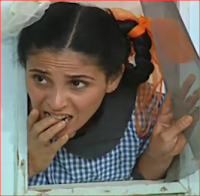PICA-1003
'92.08.25
I remember a different version of the cover. Mihoshi was in place of Washu. I find that odd, that all characters are shown before the release of the first episode, which comes out a month later. It's a good way to get a feeling the characters before they go on screen. Though, I'd rather have them come out as a surprise, then have this come out. Anyways, there is a lot planned for the future with this CD.One would expect an OST to mainly consist of, well, ORIGINAL MUSIC!! There are 8 short dramas, couple character songs, few instrumentals, and OP/ED themes in their full glory. Chisa Yokoyama, Sasami's Seiyuu, sings the ending theme. Composed by Ikuru Fujiwara, the man behind most Pioneer/AIC theme songs. He does an excellent job of capturing the fun in the anime in this one song. Chisa's voice is actually not that annoying. I can listen to this song without any qualms. Even when compared to the amazing English versions.
Unfortunately, the original OAV theme opener does not lay anywhere on this disc, but we do get the Original Version and the Re-Mix Version. Oddly, they place the remix first and the original last. The original, of course, stays true to the opener, only getting into the main arrangement immediately. Some haunting vocals have been added. Love hearing the bass. Drums are masterful. The jingles and japanese acoustic give great flavor. Just when you think its over at 1:50 it loops, but doesn't give the feeling of repitition. As Nagaoka, improvises it even further. The remix version, is not necessary, and kind of can be a turn-off. The drums are more ethereal here, as well as other instruments. I was expecting more use of synthesizers, but all instruments sound authentic on this one. The piece does feel a little slower. I actually I am happy with the turnout.
I've avoided the character songs for to long. If not for this review, I wouldn't have embraced how well done these songs are. Ryoko's seiyuu, Ai Orikasa, takes the mic in Daiichi Hakkensha Blues. The smooth rythym posed in this song goes along with the cover. As in, it gives off the whole jazz club feeling. Nagaoka and Oriakasa should go together more often. She does express her seduction as the character would in this song.
Away from the R&B section, Yumi Takada, poses as Aeka, and sings us a ballad. Seikou puts the Juraian themes in this song. Piano, harps, oboe and snare drums occupy the entire track. Takada is accompanied by some male vocals at the end. All leading to a triumphant finish.
Both Takada and Orikasa follow Masami Kikuchi in a duet, only with three people. Ueno No Koi No Monogatari continues the rythym and blues theme. I guess jazz and R&B is not so bad when in the hands of Nagaoka. Ryoko and Aeka bicker with each other, trying to out sing one another. The song almost falls apart hilariously at the end.
Now for the radio dramas, constructed by none other, lady Nahoko Hasegawa. It's worth actually getting into these voiced adventures. Out of the Tenchi dramas, these are my favorites, because she truly expresses the characters in a unique way. Hayashi Hiroki even sketches out the scenario for each drama. Giving an extra method to understanding the dialog for non-Japanese speakers.
Mini-Drama 1 sounds like they are at bar. Again, accurately depicted in the sketch above. Ryoko is daydreaming or something and Aeka breaks the fantasy. Then Aeka gets drunk as well, and she gets into her monologue. Things get wild with some rapid footwork. Aeka gives some shock therapy that tickles Ryoko.
Ryoko's Theme follows. A great representation of the character. In one of the many Tenchi books, Seikou states that Ryoko is his favorite character. It certainly shows here. The track is filled with a strong beat, synthesizers depict Ryoko's fiestiness, and at the same time her lonliness.
Second mini-drama, is a short Ryoko monologue. Tenchi and Sasami are spying on her. Trying to keep quiet and laugh at Ryoko's thoughts. Ayeka gets the third mini-drama, for the full 30 seconds. Then in the fourth, it's both of the girls, discussing something. Aeka looks for Tenchi's attention, but does not respond. She then yells for a response. Ryoko laughs at the relationship. Tenchi seems very overpowered here, but at least he says somethings. Sasami is picked on for some reason.
The middle of the OST has some long instrumentals. The first is the Ryo-Ohki Summoning, or Sneaky Tenchi theme. Bass, violins, and some acoustics quietly fill in for two minutes, before some percussive instruments take charge for another two minutes. It feels tense as it should, and the synth helps add character. Aeka's theme follows. Might take some time to actually like. Percussion and ethnic Japanese strings set the mood for the piece. Acoustic rythyms and pace establish the peaceful and proper nature that is Aeka. The opposite of Ryoko. Don't skip this theme, becuase then the character can't be fully understood.
The Destruction of the Saito Bridge, begins with synthesizers and a beat, signifying that something is emerging. The intensity builds, before some snare drums and ticking sounds give it speed. The oboe moves in for the evolution of the BGM. Guitars start getting pressed on to show the gravity of the situation. At two minutes the action begins. Oboe, clarinet and strings represent the fall of the ships. An epic track that deserves the repeat treatment.
Mini-drama 5, has Tenchi on the edge. Sasami and Aeka try to play karaoke. Sasami comes out of no where laughing in the sixth drama. Tenchi is running again.
 Another Aeka BGM insert. This sweet piano/oboe ballad is very welcoming, but is put to shame by the next BGM. The instrumental gem, Royal Teardrop of Jurai. I'm not even going to describe how powerful this ensemble is. A majestic symphony.
Another Aeka BGM insert. This sweet piano/oboe ballad is very welcoming, but is put to shame by the next BGM. The instrumental gem, Royal Teardrop of Jurai. I'm not even going to describe how powerful this ensemble is. A majestic symphony.
In the 8th drama, Ryoko sings her song which wakes up and annoyes Aeka. Whereas, in 7, Ryoko and Aeka are sneaking in the middle of the night and cross each other. They do battle. Aeka seems to be doing some damage. Sasami is awoken, wakes up Tenchi, and he has a fit by the girls destruction. They simmer down and pout about it.
Kajishima provides the character illustrations. Artwork that I cannot find in any other Tenchi media. The Washu uniform is sleek. Wish it was used in the anime. Pioneer does not mess around when it comes to extra's, but where is the music. The booklet is complete with images and descriptions. In my opinion, over the top design. Booklet barely fits in the case. Package: 10/10What is provided here is beyond complaint. The cuts between the tracks were off. It was as if it was all recorded in sit. A split second of the drama echoes into the BGM song. The BGM song carries on into the drama. With only 6 actual BGM's, it's hard to really grade the musical world of Tenchi. There could have been the Tenchi and Sasami themes at least. Aeka's themes may bore the listener, but they are quite essential. The rest of the soundtrack is a party, and Ryoko alone is a fiesta. Album: A...


























